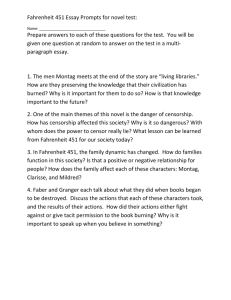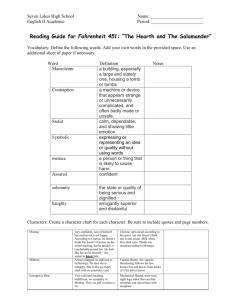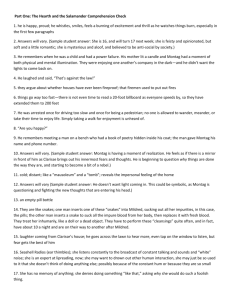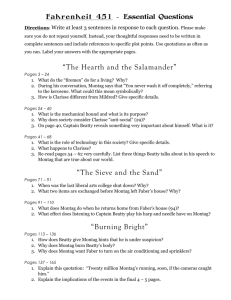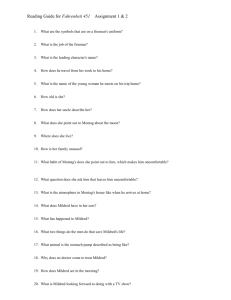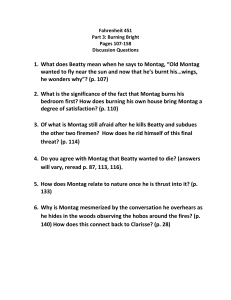RAY BRADBURY'S FAHRENHEIT 451: Character Analysis Guy
advertisement
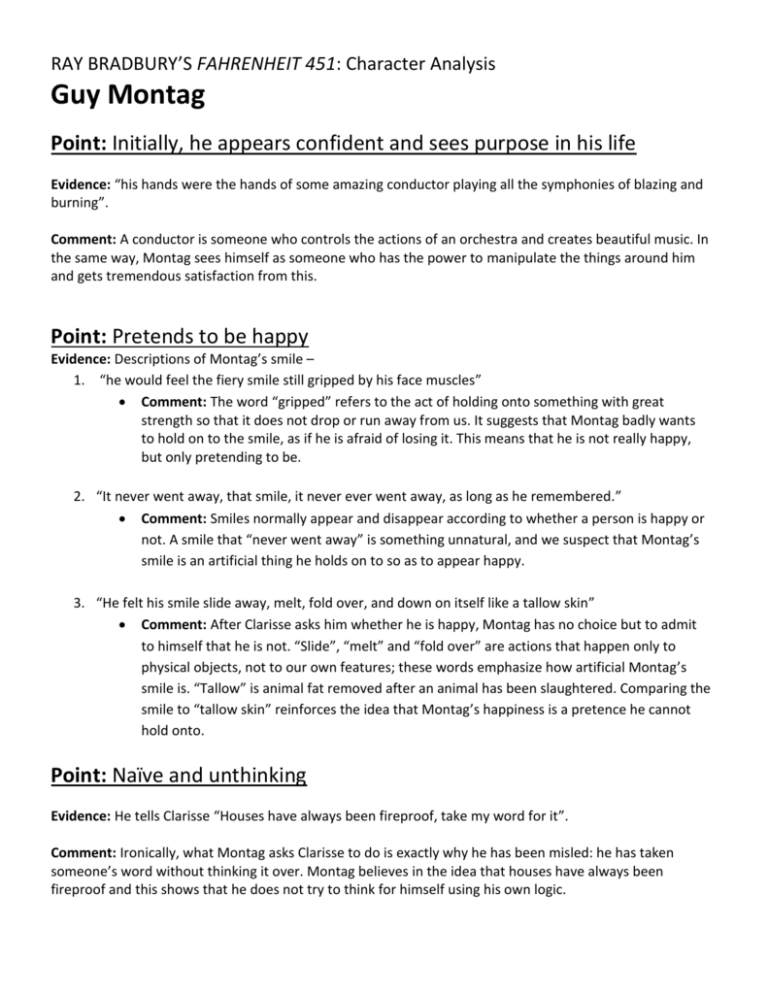
RAY BRADBURY’S FAHRENHEIT 451: Character Analysis Guy Montag Point: Initially, he appears confident and sees purpose in his life Evidence: “his hands were the hands of some amazing conductor playing all the symphonies of blazing and burning”. Comment: A conductor is someone who controls the actions of an orchestra and creates beautiful music. In the same way, Montag sees himself as someone who has the power to manipulate the things around him and gets tremendous satisfaction from this. Point: Pretends to be happy Evidence: Descriptions of Montag’s smile – 1. “he would feel the fiery smile still gripped by his face muscles” Comment: The word “gripped” refers to the act of holding onto something with great strength so that it does not drop or run away from us. It suggests that Montag badly wants to hold on to the smile, as if he is afraid of losing it. This means that he is not really happy, but only pretending to be. 2. “It never went away, that smile, it never ever went away, as long as he remembered.” Comment: Smiles normally appear and disappear according to whether a person is happy or not. A smile that “never went away” is something unnatural, and we suspect that Montag’s smile is an artificial thing he holds on to so as to appear happy. 3. “He felt his smile slide away, melt, fold over, and down on itself like a tallow skin” Comment: After Clarisse asks him whether he is happy, Montag has no choice but to admit to himself that he is not. “Slide”, “melt” and “fold over” are actions that happen only to physical objects, not to our own features; these words emphasize how artificial Montag’s smile is. “Tallow” is animal fat removed after an animal has been slaughtered. Comparing the smile to “tallow skin” reinforces the idea that Montag’s happiness is a pretence he cannot hold onto. Point: Naïve and unthinking Evidence: He tells Clarisse “Houses have always been fireproof, take my word for it”. Comment: Ironically, what Montag asks Clarisse to do is exactly why he has been misled: he has taken someone’s word without thinking it over. Montag believes in the idea that houses have always been fireproof and this shows that he does not try to think for himself using his own logic. Point: He is interested in others and will pay attention to them. Evidence: Clarisse tells him that he is “not like the others” because “When I talk, you look at me”. Comment: Montag pays attention to Clarisse when she speaks to him. This shows that he is willing to spend time and effort in getting to know others. Point: Montag is a man divided against himself. He often experiences contradictory emotions and thoughts. Evidence: “He felt his body divide itself into a hotness and a coldness, a softness and a hardness, a trembling and a not trembling, the two halves grinding one upon the other.” Comment: The pairs of words in this sentence are opposites and they tell us how Montag suffers completely contradictory emotions and feelings. In addition, the word “grinding” refers to harsh sound produced when two uneven surfaces rub against each other and tells us how painful this inner conflict is for him. Point: Montag is capable of change and growth. Evidence: When Clarisse asks Montag why he did not have any daughters since he said he felt like a father to her, he replies that it was because his wife did not want any children. Clarisse apologizes for having asked the question, but Montag replies that it is “a good question”. His response here is different from the time when Clarisse asked him whether he knew that there is dew in the grass and a man in the moon; back then, he fell into a “clenching and uncomfortable silence” after having had his ignorance exposed. Comment: This shows that Montag is capable of growth; previously, he was self-defensive whenever his image of happiness was threatened, but now he is able to answer questions about unhappy parts of his life calmly and thoughtfully. Clarisse Point: Observes the world around her with great curiosity Evidence: 1. Her face shows “a kind of gentle hunger that touched over everything with tireless curiosity”. Comment: The word “hunger” refers to the desire we have for food when we have not had it for a long time. The use of the word “hunger” tells us how eager she is to observe everything around her, as if it is food that she needs to eat. 2. Her “dark eyes were so fixed to the world that no move escaped them”. Comment: The word “fixed” refers to the act of attaching an object so that it cannot be moved or shifted. This tells us that Clarisse’s attention is truly riveted to the objects around her and that she cannot be distracted. 3. “I like to smell things and look at things, and sometimes stay up all night, walking, and watch the sun rise." Comment: She is fascinated by the real physical world around her and appreciates it with her senses. Through the actions of “smell” and “look”, she wants to take in as much of the world as possible and enjoy it. She likes “walking” at night and to “watch the sun rise”, and these actions show how strongly she enjoys the things around her. 4. “I rarely watch the 'parlour walls' or go to races or Fun Parks. So I've lots of time for crazy thoughts, I guess.” Comment: Because she does not occupy her time with mass entertainment, she has the time to think about and observe the world around her. She knows about why the billboards need to be stretched, that there’s dew on grass in the morning and that “there’s a man in the moon”. This shows that she is more interested in the real world and the sensations it offers than the man-made forms of entertainment her society offers. Point: Pays attention to others and values their presence Evidence: Clarisse’s attitude towards others can be seen from the way she speaks to them. 1. Montag “knew she was working his questions around, seeking the best answers she could possibly give”. Comment: Clarisse carefully considers what others say and thinks hard before she replies. This shows that she values the people she speaks to, and that she looks to form meaningful relationships with them. 2. She tells him “I'm not afraid of you at all." Comment: This would be a strange thing to say to a stranger you have met for the first time, but in this case, it is relevant, because Montag is a fireman and firemen are intimidating figures in this story. Clarisse’s dialogue is usually eccentric but insightful, and this shows how she thinks carefully before speaking. If she had not, then her speech might be more clichéd and predictable. Clarisse’s Relationship with Montag Point: Clarisse makes Montag feel safe and appreciated. 1. Evidence: “He saw himself in her eyes … as if her eyes were two miraculous bits of violet amber that might capture and hold him intact”. Comment: Amber is sap that flows from trees and encapsulates organisms, preserving them. In the same way, Montag feels safe in Clarisse’s presence. This shows that Clarisse has a calming effect on Montag. 2. Evidence: Montag sees a light in Clarisse’s face and thinks “It was not the hysterical light of electricity but - what? But the strangely comfortable and rare and gently flattering light of the candle.” Comment: Unlike electrical light, which may be too bright and bring out the flaws in a person’s face, candle light is soft and flattering. In the same way, Clarisse’s presence makes Montag feel appreciated and makes him forget his flaws temporarily. 3. Evidence: This comparison to the light of a candle goes deeper when we find that he has a strong and important memory associated with a candle. He had been in a power failure when he was a child, and his mother had found and lit a candle. The light it produced “drew comfortably around them” and they went on “hoping that the power might not come on again too soon”. Comment: This shows how much Montag appreciates Clarisse’s effect on him – she has an effect similar to his mother, who made him feel protected and unafraid. Point: Clarisse helps Montag reflect on his life and prompts him to search for meaning and purpose in his life 1. Evidence: Clarisse “had a very thin face like the dial of a small clock seen faintly in a dark room in the middle of a night when you waken to see the time and see the clock telling you the hour and the minute and the second, with a white silence and a glowing, all certainty and knowing what it has to tell of the night passing swiftly on toward further darknesses but moving also toward a new sun.” Comment: When we wake up in the middle of the night, we often have no idea what time it is and remain disorientated until we find a clock to tell us what time it is. In the same way, Clarisse seems to have an enlightening affect on Montag and points him in the direction of knowledge. The word “darknesses” may refer to the crises that Montag will be plunged into, and the phrase “a new sun” may refer to the eventual enlightenment that he will find in the end. 2. Evidence: “How like a mirror, too, her face. Impossible: for how many people did you know that refracted your own light to you? People were more often - he searched for a simile, found one in his work - torches, blazing away until they whiffed out.” Comment: A mirror reflects our image back so that we can examine ourselves. In the same way, Clarisse’s words and response to Montag enable him to reflect on his own thoughts and actions. In contrast, most people are like torches, which “blaze away”. Blazing produces great amounts of heat and light, and people who “blaze away” are more interested in showing their personality to others than finding out more about others. In the presence of such people, you have to keep watching and listening to them, and end up having little room for self-reflection. 3. Evidence: “He wore his happiness like a mask and the girl had run off across the lawn with the mask and there was no way of going to knock on her door and ask for it back.” Comment: Clarisse forces Montag to see the truth he has been hiding away from: the fact that he is in fact very unhappy with his life. A mask is something you wear to hide your identity; in Montag’s case, he has been hiding his unhappiness from himself. Clarisse is the girl who has “run off” with the mask and forced him to see himself truthfully for the first time. MILDRED Point: Mildred isolates herself from the real world through her obsession with mass entertainment Evidence: 1. Her room is consistently linked with death: i. We learn that the bedroom is like “the cold marbled room of a mausoleum after the moon had set. Complete darkness, not a hint of the silver world outside, the windows tightly shut, the chamber a tomb-world where no sound from the great city could penetrate”. ii. She lies “stretched on the bed, uncovered and cold, like a body displayed on the lid of a tomb” Comment: The words “mausoleum” and “tomb” refer to places where corpses are kept, and the description of Mildred lying “like a body displayed on the lid” shows that she is the one who creates that atmosphere of deathly confinement. We learn therefore that she has isolated herself from the real world. 2. We learn that Mildred has “her eyes fixed to the ceiling by invisible threads of steel, immovable”. Comment: A ceiling is a plain block of concrete that blocks your view of the world above it. This shows that Mildred has her view of the outside world obstructed. “Threads of steel” are unbreakable objects and this shows how difficult it is to get Mildred to transfer her attention elsewhere. 3. The “thimble radios” are called Seashells and are associated with the ocean: i. “And in her ears the little Seashells, the thimble radios tamped tight, and an electronic ocean of sound, of music and talk and music and talk coming in, coming in on the shore of her unsleeping mind.” ii. “Every night the waves came in and bore her off on their great tides of sound, floating her, wide-eyed, toward morning. There had been no night in the last two years that Mildred had not swum that sea, had not gladly gone down in it for the third time.” Comment: People say that when we press the opening of a seashell against our ear, we hear the sound of the sea. However, we know that the sound produced is not from the real sea, but from the emptiness of the shell. In the same way, the sounds produced by these thimble radios do not allow Mildred to experience reality and only give her the illusion of being happy. The sound produced by the thimble radios is compared to “an electronic ocean of sound” that “bore her off”. This suggests that she surrenders her senses to the sounds in the radio and allows her mind to be manipulated by it. We also learn that she has “gladly gone down in it” many times, and like a person immersed in water, she blocks out the real world when she presses the radio into her ears. Therefore, Mildred is someone who allows mass entertainment to block out the real world and all its authentic experiences. Not only does she not see the physical world, she is also unresponsive and insensible to her husband’s presence. Point: Mildred is unreflective and lacks self-understanding. She does not take responsibility for her own mind and body. Evidence: After the apparently traumatic operation where Mildred has tubes stuck inside her body, she wakes up having no idea what had happened the previous night. When Montag tells her that she had taken too many sleeping pills, she insists that she would never do such a thing. Comment: Mildred denies having taken too many pills when it obviously happened, and does not realize she needed an operation to survive the overdose. This shows that she is totally oblivious to her own actions. She seems totally reliant on the machine that pumped out the drugs and replaced her blood, as she does nothing at all to prevent another overdose. This shows that she lacks responsibility for her own life. Point: Mildred is self-absorbed and cares only about her own needs. Evidence: 1. Montag “felt his way toward his open, separate, and therefore cold bed”. Comment: It is normal for husband and wife to share a common bed as this symbolizes their togetherness. The “separate” bed is a sign of the emotional distance between Montag and Mildred. She does not show any love towards her husband. 2. Mildred was “an expert at lip-reading from ten years of apprenticeship at Seashell ear-thimbles.” Comment: Instead of removing her ear-thimbles so that she can listen properly to her husband, she looks at his lips to guess what he is saying. This shows that she is more interested in her entertainment than her husband’s words. 3. When Montag says that the new wall-TV would cost him "one-third of my yearly pay", she replies that "It's only two thousand dollars" and "I should think you'd consider me sometimes”. Comment: She does not think about what a financial burden the purchase of a new wall-TV would create for her husband and ironically asks him to “consider” her when she should show some consideration for him instead. This shows how selfish she is. Point: Mildred is interested only in pleasures that stimulate the senses intensely Evidence: While driving her car, Montag asks her to drive slower, but she ends up pushing the speed to “one hundred and five miles an hour”. Comment: Mildred enjoys the raw sensation of travelling at high speed. This shows that she prefers having her senses stimulated by intense bodily sensations rather than pursuing more intellectual pastimes. Point: Mildred pursues external beauty Evidence: She is described as having “her hair burnt by chemicals to a brittle straw”, ”the body as thin as a praying mantis from dieting”, and “her flesh like white bacon”. Comment: The word “chemicals” suggests that she has dyed her hair to look blonde like “straw”, but the words “brittle straw” and “burnt” imply that she has simply overdone it and destroyed the natural vitality of her hair. As for her dieting, we learn that it has made her “as thin as a praying mantis”; as this is an insect that is stick-like, we can imagine how emaciated she must be. Finally, bacon when cooked is flat and rough; having flesh like “white bacon” suggests that she has subjected her skin to unnatural whitening, and that has resulted in it losing its healthy texture. All in all, we learn that Mildred is obsessed with her appearance and this has resulted in her putting her body through excessive modification. Instead of taking care of her body, she ends up destroying it. Mildred’s Relationship with Montag Point: She does not seem concerned about his feelings Evidence: Montag is traumatized by the suicidal actions of the old lady whose house they were burning and cries when he gets home. Mildred knows this too, because she feels his face with her hand and “he knew that when she pulled her hand away from his face it was wet”. However, she does not try to comfort him; instead, we find her “listening to far people in far places” through her Seashell radio. Comment: We would expect a wife to care about her husband when he is crying, but Mildred here shows no concern whatsoever. Instead of showing concern for someone close to her, she listens to “far people in far places”. The repetition of the word “far” emphasizes how the people she prefers to show interest in bear little relation to her and highlights her lack of concern for Montag. Point: She has little love for Montag. Evidence: When Montag asks her where and when they first met, her response is to first say “how funny, not to remember where or when you met your husband or wife” and then to finally say that “It doesn’t matter”. Comment: The place and time when lovers first meet is an important chapter of their lives together and even if one cannot remember these details, one would not dismiss it so easily. Mildred first tries to see it as a joke, and then totally dismisses it. This clearly shows that she places little value in the romance she once shared with Montag. Point: Montag’s love and concern for her have been eroded. Evidence: We know that Montag is concerned for her well-being because he calls for an ambulance when she suffers an overdose of sleeping pills. However, Montag is also sure that when she dies, he will not cry because it would be “the dying of an unknown, a street face, a newspaper image”. Comment: We know that Montag still feels concern for Mildred because he desperately calls for the ambulance when he discovers that she has suffered an overdose. However, this concern is not love, because he is sure he will not cry for her when she dies. The words “street face” and “newspaper image” refer to the faces of strangers whom we would not miss if they died. This shows that Montag no longer sees Mildred as an important part of his life. BEATTY Point: Knowledgeable about Literature and History Evidence: He knows who the old lady who burnt herself was quoting when she said “Play the man, Master Ridley” and informs the other firemen that it was "a man named Latimer said that to a man named Nicholas Ridley". He admits that he is "full of bits and pieces". Comment: This shows that Beatty is well-read and well-informed. Quoting what Latimer said and remembering the exact words is proof that he not only read the historical account but knew it very well. Throughout the novel, he shows this ability to quote from various texts. Point: Charismatic and has aura of authority Evidence: Montag wants to feign illness but knows that if he were to speak to Beatty, he would not be able to resist saying he was well enough to return to work. Also, when Beatty asks Mildred to "Shut the 'relatives' up", she immediately obeys even though she did not when Montag asked her to. Comment: The ways that Montag and Mildred respond to Beatty show that he has an aura of command that cannot be resisted. FABER Point: Appears to be lacking in spiritual energy and strength Evidence: “There was white in the flesh of his mouth and his cheeks and his hair was white and his eyes had faded, with white in the vague blueness there.” Comment: The word “white” is repeated several times, and suggests the idea of palor, the lack of blood. In the same way, Faber lacks belief in himself and does not have the courage to do what he believes in. Point: Filled with self-contempt Evidence: He tells Montag that he is “looking at a coward” and admits that because he did not speak up for those who were unfairly accused in the past, he too is guilty. Comment: “Coward” and “guilty” are both negative terms a person would normally avoid, yet Faber openly accuses himself of these two traits. He is therefore full of disdain for his own actions. Point: Tends to avoid involvement and risk Evidence: Montag wants Faber to help him with his plot to frame firemen for possession of books, but Faber asks Montag to “Let the war turn off the 'families'” and that “Our civilization is flinging itself to pieces”. He also advises HOD to “stand back from the centrifuge." Comment: We notice that Faber is fond of abrogating personal responsibility to external forces like “the war” and “civilization”; he wants to think that things can get better without himself getting involved and running the risk of being punished. This shows that he is afraid of becoming implicated and does not want to take risks.
